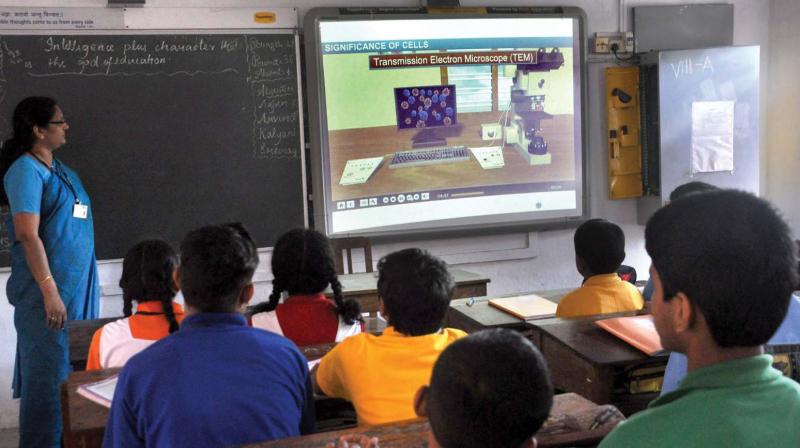Kerala: Classrooms turning hi-tech
Project is being piloted in Alappuzha, Puthukad, Kozhikode North and Taliparamba.

Thiruvananthapuram: The state government is going ahead with its ambitious programme of making all classrooms in the state high-tech. The project, which commenced in September, is being piloted in Alappuzha, Puthukad, Kozhikode North and Taliparamba Assembly constituencies. The preparations to expand the programme to the remaining 136 constituencies are progressing. The survey initiated by the state government to identify the needs of schools to make the classrooms hi-tech will end on December 5.
K. Anvar Sadath, executive director, IT@School Project, told Deccan Chronicle that the survey would assess the present infrastructure and upgradation required in each school. For example, one school may have 40 classrooms. Of them 20 would be completely enclosed. These classrooms can be made high-tech in the first phase and the rest after upgrading them in the next phase, Mr Sadath said.
The survey will be followed by an audit of the present infrastructure in schools. The list of information and communication technology (ICT) equipment for the schools will be finalised based on the inputs from the IT audit then and also after reviewing the school’s individual plan for implementing the programme. The faulty ICT equipment will be repaired to ensure the availability of sufficient hardware, Mr Sadath said.
The schools will have to provide the basic facilities to set up high-tech classrooms and computer labs and ensure that each classroom and lab has tiled flooring, a secure ceiling in case of tiled roof, locker facilities, shelves and racks for keeping the equipment, painted, clean walls and a secure electrical connection with enough plug-points. Schools can make use of various funding sources such as MP/MLA funds, funds from local bodies, school PTA/SMC/alumni and contributions from individuals and institutions to ensure the required infrastructure.
In the first phase, ICT equipment will be deployed in the hi-tech schools at the ratio of one computer lab for every 15 divisions. Each lab will contain enough number of computers in the proportion of 3:1 so that all students in the division with maximum strength can use them at a time.
The computers in these labs will have a central server connectivity backed by a high-speed broadband connection in addition to an online UPS for power backup. An LCD projector / LED television will also be made available in these labs. Specific software such as ORCA for differentially-abled students will be installed in the computers. A team comprising school IT co-ordinators and student school IT co-ordinators will be set up in each school. The IT co-ordinators will be provided training to extend technical support for supplementing digital content development locally. A team of school student IT co-ordinators will be formed in each school to provide specific training in computer hardware, electronics, movie making and animation, internet, cyber security and Malayalam computing.
Hardware clinics would be conducted at regular intervals to rectify the faulty computers and ICT equipment. A state-level call-centre mechanism will be set up for resolving the technical issues in each hi-tech school. A detailed plan for addressing the ‘e-waste’ being accumulated in schools will be finalised subsequently. Specific systems will be put in place for documenting the progress of each activity in the schools and to recommend ways of improvement.
Each school will be provided with individual pages in the general portal and SchoolWiki for this process. There will also be a mechanism for recording the best practices in each hi-tech school. The recorded contents will be edited and evaluated by a panel of experts and based on their recommendations, the best will be displayed in a general portal. The best locally-made digital contents will make their way to the general server. Digital contents will be made with the active participation of teachers and students. Necessary training and support will be provided to each hi-tech school for attaining self-sustainability in content development. Special encouragement will be given to best performers.
Monitoring systems such as real-time feedback collection, school visits, online monitoring systems, regular review meetings and essential upgadation will be implemented in a time-bound manner. The programme will be closely monitored and evaluated by the panchayat/constituency/district/state -level mission teams and a taskforce, which will be formed as part of the general education protection mission. This was announced as part of the Nava Kerala mission launched on November 1, the 60th anniversary of Kerala Piravi. The IT@School project has been entrusted to form a special purpose vehicle (SPV) to oversee the programme in hi-tech classrooms.

